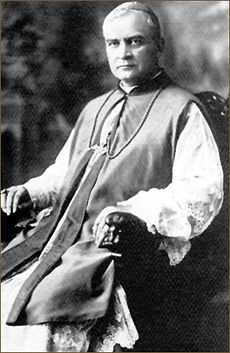Jurgis Matulaitis-Matulevičius
| Blessed Jurgis Matulaitis Matulevičius | |
|---|---|
 | |
| Bishop of Vilnius | |
| Born |
13 April 1871 Lūginė, Lithuania |
| Died |
January 27, 1927 (aged 55) Kaunas, Lithuania |
| Venerated in | Roman Catholic Church |
| Beatified | 28 June 1987 by John Paul II |
| Feast | 27 January |
Jurgis [George] Matulaitis (Polish: Jerzy Matulewicz; 13 April 1871 in the village of Lūginė, near Marijampolė, Lithuania, Russian Empire – 27 January 1927 in Kaunas, Lithuania) was a Roman Catholic Bishop of Vilnius from 1918 to 1925 and founder of the Sisters of the Immaculate Conception of the Blessed Virgin Mary. On 28 June 1987, Pope John Paul II beatified him as the Blessed Jurgis Matulaitis-Matulewicz.
Biography
Matulaitis was the son of poor farmers and baptized at the monastery church of the Marian Order in Marijampolė. He learned his Catholic faith in catechism class at the monastery, from the Marian priest, Jurgis Cešnas. He was orphaned at an early age—his father dying in 1874, and his mother in 1881. In his youth, Matulaitis developed a weakness in his right arm and leg, that prevented him from working with his brother on the farm, and kept him away from classes at the school. His illness was years later diagnosed as tuberculosis of the bone, which he suffered with for the rest of his life.
Much time spent alone, led Matulaitis to develop his keen intellect. When his uncle, a priest in Warsaw, Poland, saw his potential, he offered to pay for his high school education at a minor seminary. And when civil authorities closed the Warsaw seminary, Matulaitis moved to the only remaining seminary in the Russian Empire, the Saint Petersburg Roman Catholic Theological Academy. Ordained to the priesthood on 20 November 1898, his high academic marks led his bishop to send him to the University of Fribourg, in Switzerland, for doctoral work.
Outside the watchful eye of the Russian civil authorities, Fribourg became a place for free discussion of the sad state of the Lithuanian homeland. With other students from Lithuania, Matulaitis talked about a Catholic cultural revival. Becoming convinced that religious Orders were best suited to the work of such a revival, Matulaitis traveled home, to Marijampolė, to discuss with one of the last remaining members of the suppressed Marian Order the possibility of secretly resurrecting the group. Trips to Rome and Marijampolė set the plan, approved by the Marian Superior Vincent Senkus, in motion.
Matulaitis completed his doctorate in theology at the University of Fribourg, Switzerland. He then returned to teach Latin and canon law in the seminary in Kielce. He then moved on, to head of the newly established sociology department, and served as vice rector of the St. Petersburg Spiritual Academy, teaching dogmatic theology. All the while the renewal of the Marians was taking place in secret. Pope Pius X approved a new interim Constitution as the group's rule. Matulaitis then secretly took vows of poverty, chastity and obedience as a member of the Marian Congregation in 1909. With the death of the last Marian, Fr. Senkus, a hastily organized meeting on 14 July 1911, elected Matulaitis the Superior General of the Congregation of Marians, which, at that point, consisted of him and 2 other priests—though there were seminarians preparing to join the group. Though he was a respected teacher, priest, spiritual director and confessor, Matulaitis' secret work with the Marians put the renewal—and the Seminary—in danger. Matulaitis decided it was time to resign his position at the academy to work for the Marian Order.

With some small success reviving the Marians, Matulaitis began reclaiming the monastery properties of the old Order. He also established Marian religious houses and houses for training new members (novitiates) at Bielany, Poland, Marijampolė, Lithuania, Fribourg, Switzerland, and Chicago, Illinois. Just as it seemed the work of the Marian renewal was seeming to take root, Matulaitis heard the rumors that he was being considered for the position of bishop. He accepted the call of Pope Benedict XV to serve as the Bishop of Vilnius. Matulaitis had just founded the Sisters of the Immaculate Conception of the Blessed Virgin Mary in Lithuania, 15 October 1918. ( He also founded another Congregation, the Handmaids of Jesus in the Eucharist, in 1924, in Belarus). He was installed as Bishop of Vilnius on 8 December 1918.
For seven years, he headed the diocese of Vilnius through the aftermath of World War I. Vilnius Region was at the center of the Lithuanian–Soviet, Polish–Soviet and Polish–Lithuanian Wars. The constantly shifting battle lines meant that Vilnius changed hands frequently between Germans, Bolsheviks, Lithuanians, and Poles. Finally, wearied by his efforts, Matulaitis requested to be relieved of his pastoral duties in 1925. But no sooner was his request granted, than he was appointed Archbishop by Pope Pius XI, and sent back to Lithuania to negotiate a concordat between the new nation of Lithuania and the Vatican, and establish the nation's dioceses.
In 1926, as Archbishop, Matulaitis traveled to the United States for a second time, and participated in a Eucharistic Congress in Chicago. He returned to Lithuania and completed the negotiations with the Lithuanian government. In Kaunas, a city under curfew, Matulaitis fell ill. Because of the curfew, he remained in his apartment, and died of a ruptured appendix on 27 January 1927.
Personal Motto
Overcome evil with good. (Lith.: Nugalėk blogį gerumu.)
- --taken from Saint Paul the Apostle; inscribed on Matulaitis' coat of arms.
Titles
- Bishop of Vilnius
- Titular Archbishop of Adulis
- Superior General of Congregation of Marian Fathers
External links
- (English) Short biography
- (English) Marians society
- (English) Short biography
- (English) catholic hierarchy
- (English) Blessed Matulaitis-Matulewicz's website
- (English) Blessed Matulaitis-Matulewicz's journal
- (English) Blessed George (Jurgis) Matulaitis, Bridges Issue 6
|